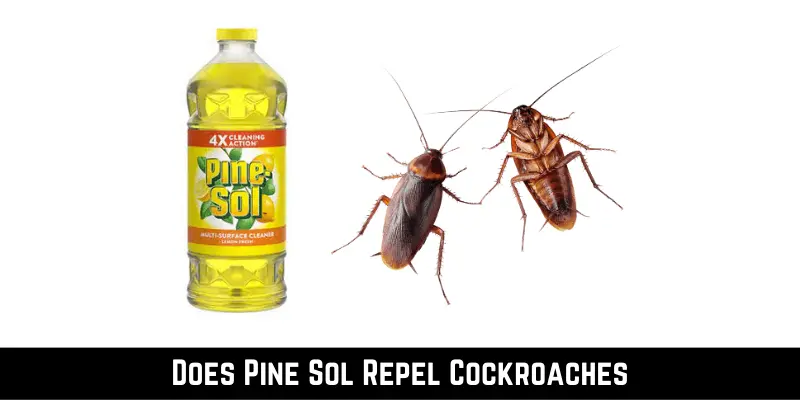Like many other household cleaners such as bleach, Pine-Sol has a potent odor and can kill an insect on contact. These chemicals are contact insecticides. Strong smells could keep roaches away. So, does pine sol repel cockroaches or attract them?
Yes, Pine-Sol repels cockroaches due to its strong odor. Spraying a significant amount of Pine-Sol on them can kill them on contact. It’s effective in keeping roaches away for prolonged periods due to its lasting scent on surfaces.
Pine sol will also kill roaches on contact if you spray a lot of it on them. This blog has a lot of information about how to get rid of cockroaches with pine sol and other ways to use pine sol.
About Pine-Sol
Pine-Sol is a registered trade name for a line of cleaning products made by the Clorox Company. These products are used to clean oily and heavy soil stains around the house. Pine oil was used to make Pine-Sol.
Pine-Sol lemon-scented cleaning products get rid of smells, clean, and kill germs. Use this cleaner in your home to clean floors, counters, stoves, tubs, shower stalls, tile, and other non-porous surfaces. It smells like lemons.
When Pine Disinfectant Cleaner is mixed with water, it makes clear solutions that are safe to use. Use solutions that are safe for most common metals, plastics, PVC, synthetics, enamel, tile, and synthetics. The fresh aroma of pine makes cleaning a breeze and ensures that surfaces always have that “recently cleaned” feel.
Are Cockroaches Attracted To Pine Sol?
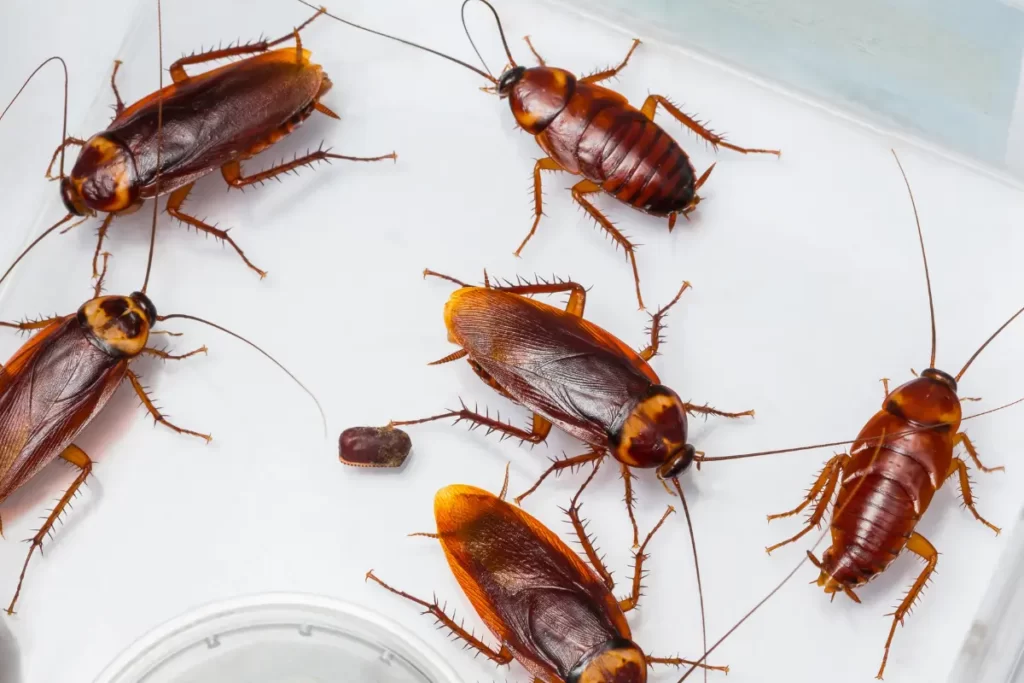
No, Pine-Sol doesn’t attract roaches. Instead, it works very well to get rid of them. Pine-sol is said to be effective at keeping roaches at bay. It has a pleasant and energizing aroma due to the presence of a natural ingredient such as pinus palustris oil, in addition to the presence of several different compounds.
Pine Spraying a significant amount of Sol on roaches causes instantaneous death. Pine-sol stays on surfaces for a long time after you spray it on them, keeping roaches away.
Cockroaches don’t have ears or other organs that help them talk to each other. Instead, they talk to each other through chemicals called pheromones. Cockroaches make smelly chemicals called pheromones.
These chemicals bind to pheromone-binding proteins on cockroaches’ antennae and make nerve cells work. That’s why the strong scent of pine will keep cockroaches away.
Do Cockroaches Like Pine Bark?
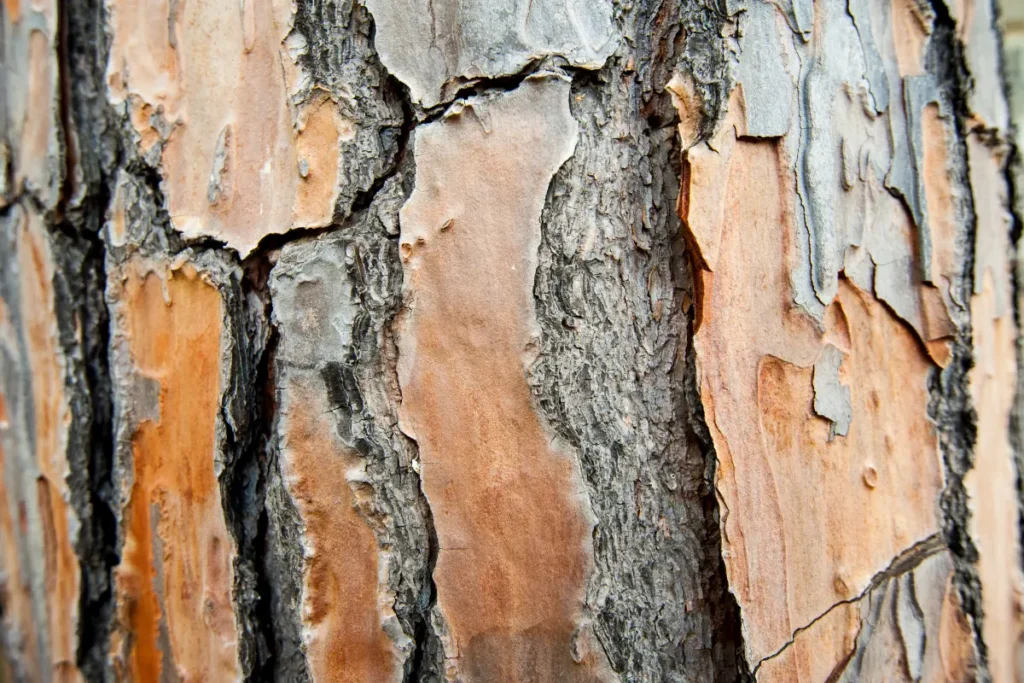
Roaches might like the smell of pine bark. Because pine bark mulch is so light, most cockroaches find it to be an ideal living environment. This enables the cockroaches to bury themselves quite profoundly within the mulch.
They are omnivores, which means they eat many things, like dead pine plants and other organic waste. Since pine bark is also wood, it could be a food source for roaches. But it’s important to remember that cockroaches like damp places and are often found in moist areas. If you have a problem with moisture in your home, that may be what’s attracting the roaches, not the pine bark.
How Does Pine Sol Keep Cockroaches Away?
Pine Sol is not meant to keep roaches away. Some people think the strong smell could keep roaches away, but no scientific proof supports this. Follow these steps to keep roaches away with Pine-Sol:
- Dilute Pine-Sol mix 1 gallon of water and 1/4 cup of Pine-Sol.
- Spray diluted Pine-Sol on roach-infested surfaces using a spray bottle.
- Or, you could scrape the surface with the solution, paying special attention to areas with roaches.
- When you use Pine-Sol or any other product, you should always follow the instructions and safety tips on the label.
- Before using it on a bigger surface, it’s also a good idea to test it on a small, hidden area to see if it works.
How To Get Rid Of Cockroaches With Pine Oil?
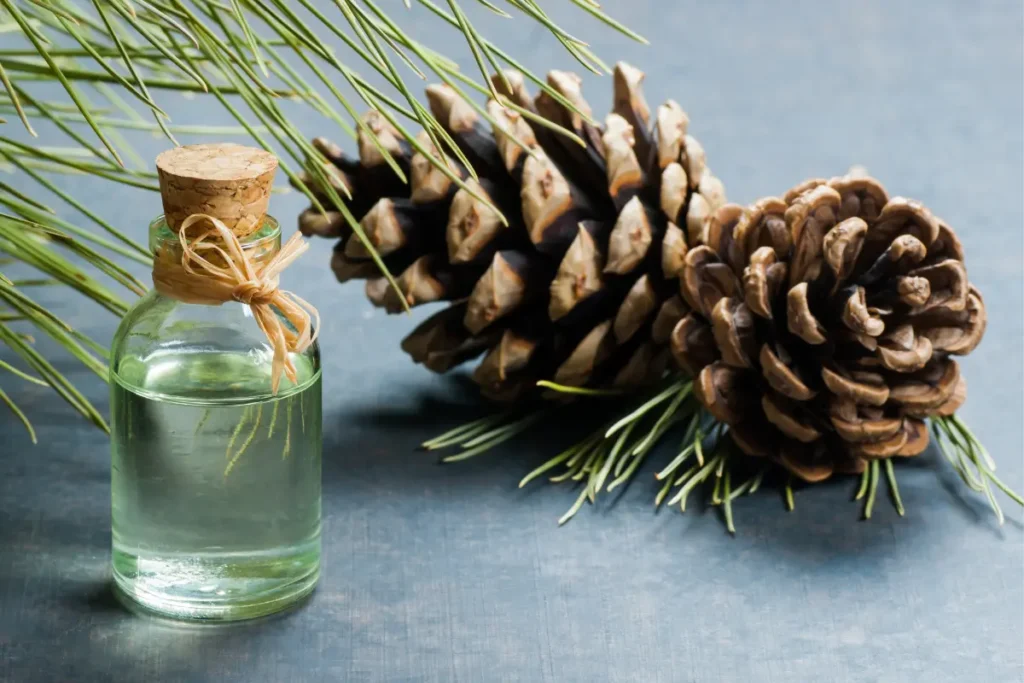
Pine oil, one of the main ingredients in Pine-Sol, is sometimes suggested as a natural way to get rid of cockroaches. Cockroaches do not like pine oil.
Follow these steps to make the pine oil spray:
- You can make a spray bottle of oil and water and then spray the desired areas.
- Fill the spray bottle about 3/4 of the way with tap water.
- Drop about 10-12 drops of pine oil into the water to dilute the mixture.
- Spray only in places where you want to keep cockroaches away, such as window frames, door frames, the bottom of your bed, and anywhere else that worries you.
Remove Cockroaches Without Using Pine-Sol
Following are the ways to get rid of roaches without using pine-sol:
Restriction of Water Source Access
- Keeping cockroaches from getting easy access to water can help get rid of them.
- Cockroaches need water to live, so if you take it away or make it hard for them to get it, they are less likely to come into your home.
- This means fixing pipes and faucets that leak, getting rid of any pools of water, and not leaving water dishes for pets out overnight.
Pyrethroids
- The use of dust that includes pyrethroids has proven effective for controlling cockroach populations.
- Pyrethroids are made from a natural insecticide that is found in chrysanthemum flowers. They kill insects by attacking their nervous systems.
- Dust formulas are often used to kill cockroaches in cracks, crevices, and other hard-to-reach places where they hide or move.
- When cockroaches eat or breathe in the dust, it can kill them.
Insect growth Regulators
- In accord with J Pestic Sci Insect growth regulators are excellent cockroach control agents because they inhibit juvenile cockroaches from maturing into adults.
- These products stop the insects from growing and developing as they should, which kills them in the end.
- Insect growth regulators come in different forms, like sprays, baits, and traps, and they can be used with other ways to get rid of cockroaches to make them work better.
Boric Acid
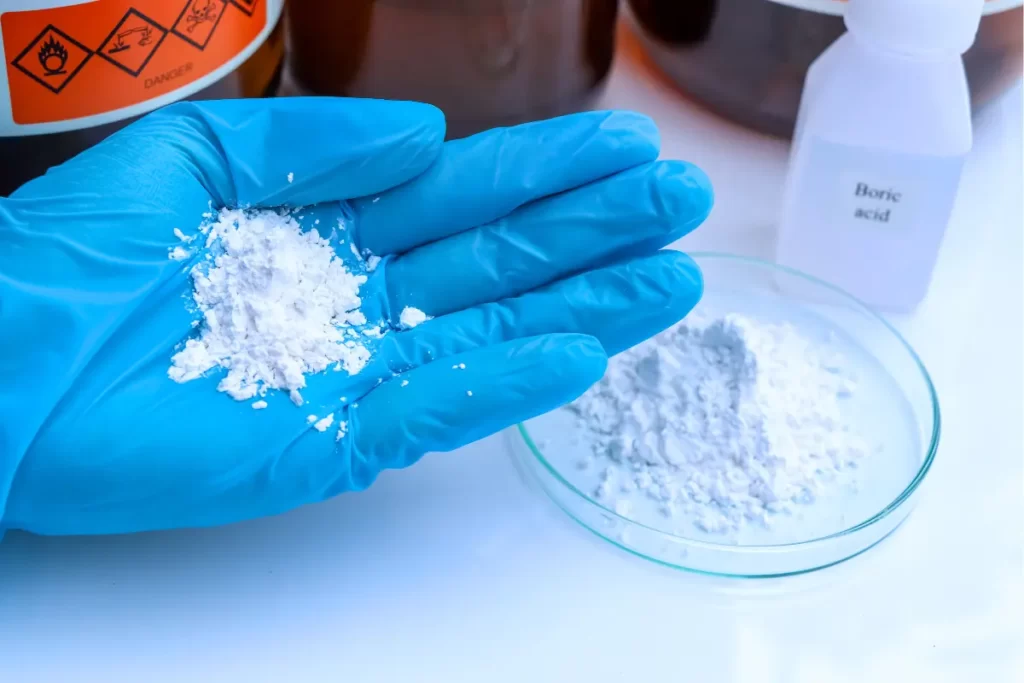
- According to J Econ Entomol, boric acid is sometimes a good way to kill cockroaches.
- It is a white powder that can be used as dust or combined with water and sugar to make bait.
- When cockroaches make contact with boric acid, it can have different effects on them. Their legs and wings get stuck to it.
- When roaches eat the powder, it affects their nervous and digestive systems, killing them quickly.
- It can hurt their outer shell and make them lose water, killing them.
- It can also get into their bodies when they groom themselves or eat the bait, which makes them sick or kills them.
Borax
- Cockroaches can be killed using borax, which is poisonous if they eat it.
- Borax is a naturally occurring mineral composed of sodium, boron, oxygen, and water. It is also known as sodium borate.
- It is often used to clean, kill insects, and feed plants, among other things.
- Borax should be used cautiously, as it can harm humans and animals.
- Borax, sugar, and water should be mixed to make bait, then put in places where cockroaches are often found.
Fipronil
- Fipronil can be an excellent way to eliminate cockroaches.
- It is a slow-acting pesticide that affects insects’ central nervous systems, particularly cockroaches.
- Fipronil is the main ingredient. .05% of it affects the roach’s central nervous system, which kills it in 6 to 24 hours.
- When cockroaches live together in a colony, they touch each other and pass on an insecticide that way.
- Fipronil can be used in many ways, such as in baits, gels, and sprays.
Diatomaceous Earth
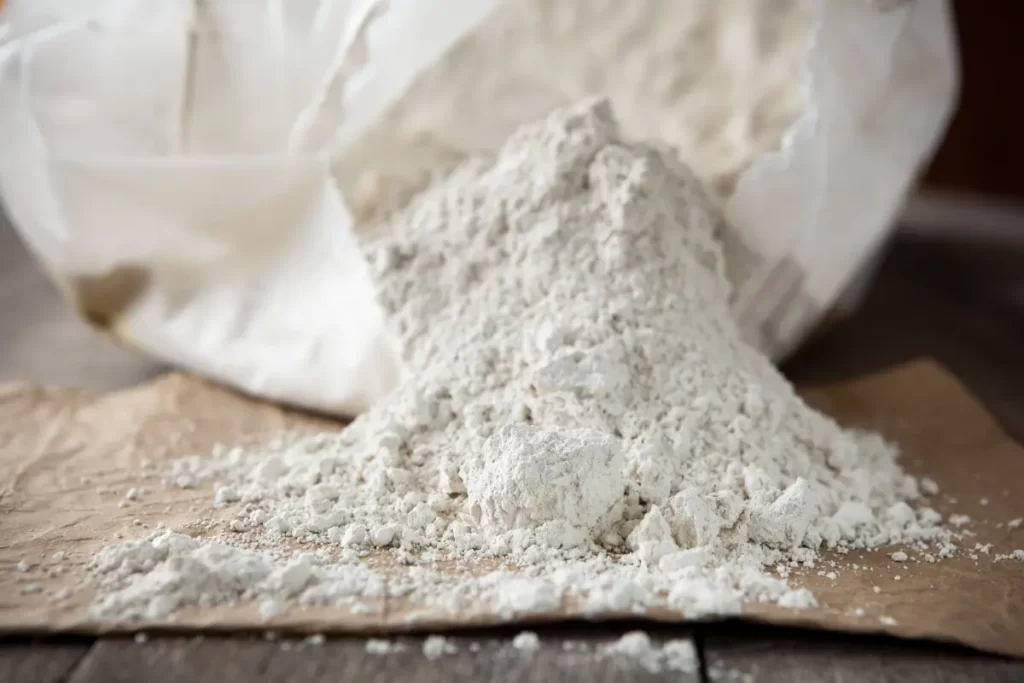
- Diatomaceous earth can kill cockroaches.
- It is a natural chemical that is produced from the fossilized remnants of very small aquatic organisms that are referred to as diatoms.
- When DE is used as a fine powder, it can cause cockroaches to lose water and die by scratching their outer shell.
- DE can be put in places where cockroaches are likely to go, such as cracks, crevices, and other hiding places.
- It is a safe and non-toxic way to eliminate cockroaches and other insects that crawl.
Pine Sol Other Benefits
Pine-Sol is mostly used as a cleaner and disinfectant for the home, but it could also be beneficial for:
| Deodorizing | Pine-Sol can get rid of bad smells in your home. It has a strong pine scent that can mask pet or cooking odors. |
| Stain Remover | Pine-Sol can eliminate stains on clothing, upholstery, and carpeting, among other things. |
| Insect Repellent | Pradeep Mittal thinks that the strong smell of Pine-Sol can help keep bugs like mosquitoes and flies away. |
| Detoxifier | Take one to two drops of pine oil with other detoxifying ingredients, such as raw honey and lemon, to help stimulate the digestive organs. This can function as a natural liver cleanse. |
| Aromatherapy | In aromatherapy, the smell of pine oil is used to help people relax and feel less stressed. |
| Headache | Pine oil is a great headache remedy because it can help eliminate toxins in the air or around your home that can make you sick or give you headaches. |
| Skin Care | Pine oil, according to Australas J Dermatol, is a natural acne treatment that works quickly and effectively. Pine oil may also help with skin problems like warts, boils, eczema, and itching because it can kill bacteria and fungi. |
Final Thoughts
There is no scientific evidence that pine repels cockroaches. Some people think the smell of pine or pine oil can keep cockroaches away from clothes and other things. Food, drink, and shelter are more attractive to cockroaches than specific scents or odors.
So, the best way to stop cockroach infestations is to clean the house, get rid of food and water sources, and seal cracks and crevices in and around the house to make it harder for them to hide.
If you already have cockroaches, the best way to get rid of them is to use tried-and-true methods, like chemical baits, sprays, or dust, or to call a professional pest control service.
References
Barnes TM, Greive KA. Topical pine tar: History, properties and use as a treatment for common skin conditions. Australas J Dermatol. 2017 May;58(2):80-85.
Jindra M. New ways and new hopes for IGR development. J Pestic Sci. 2021 Feb 20;46(1):3-6.
Sierras A, Wada-Katsumata A, Schal C. Effectiveness of Boric Acid by Ingestion, But Not by Contact, Against the Common Bed Bug (Hemiptera: Cimicidae). J Econ Entomol. 2018 Dec 14;111(6):2772-2781.
